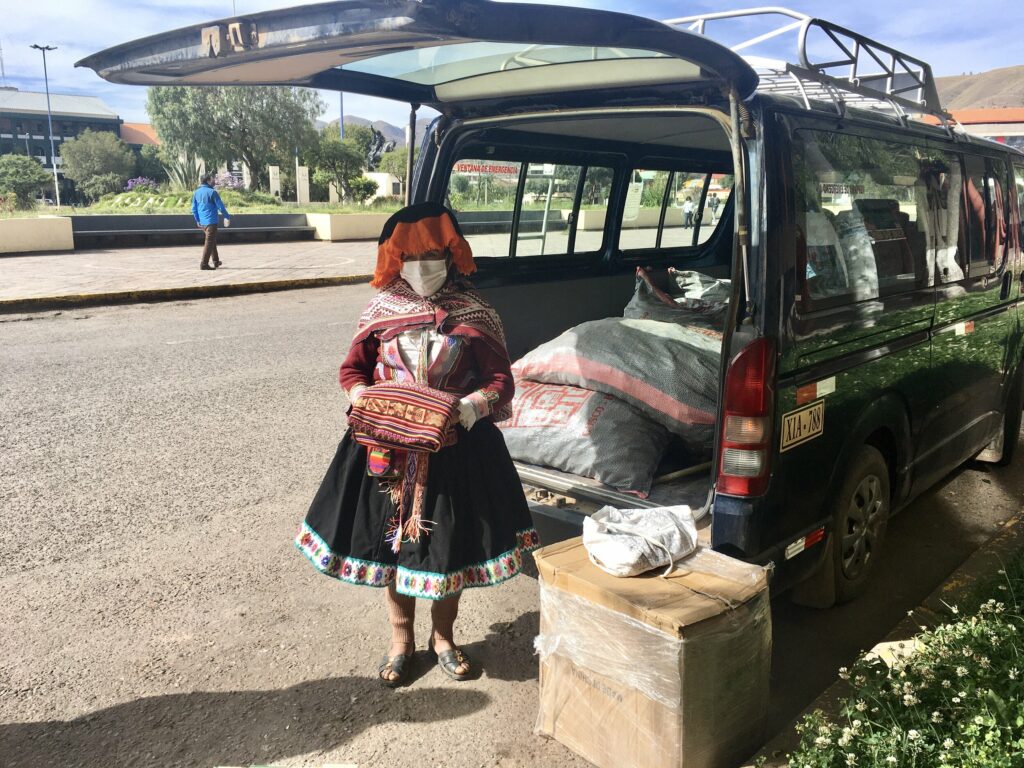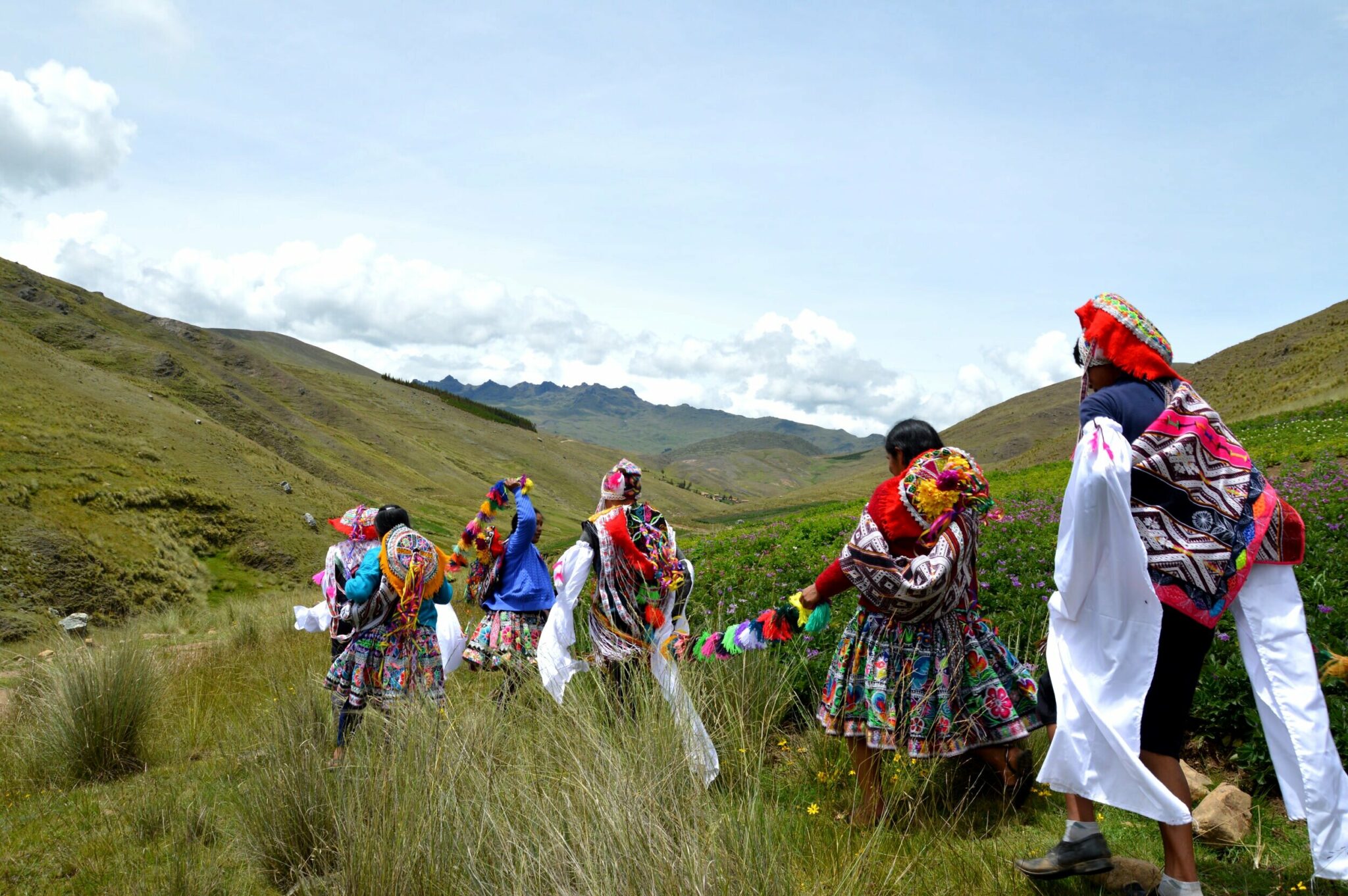In July, the Global Tapestry of Alternatives (GTA) hosted a webinar featuring the stewards of the Potato Park in Cusco, Peru.
The International Network of Mountain Indigenous People (INMIP), Asociación ANDES, and the Potato Park maintain the largest potato biodiversity hotspot in the world. Six Indigenous Quechua communities established the Potato Park as a “Food Neighborhood” in Peru in 2000. They work together to conserve more than 1365 varieties of potatoes (both wild and cultivated), a wonderful example of territorial management by indigenous communities.
For the Quechua people, cultivating is a way of life. They use their tradition and knowledge to maintain agrobiodiversity, which in turn sustains their culture. Potatoes are food, medicine, and cultural symbols. Importantly, preserving the biodiversity of potatoes is crucial for communities in this region — and indeed, for all of us — to maintain resilience to climate change. The Agroecology Fund is honored to support their work.
In case you missed it, here are some key takeaways from the exchange:
“Preserving biodiversity preserves culture, knowledge, and experience.”
The webinar began with a ceremony to honor Apu (the mountains), and Inti (the sun) using coca leaves (a form of payment to Pacha Mama (Mother Earth), in gratitude for what the earth brings to the people). The participants conducted the ceremony in the mountains, and then observed a moment of silence to honor those who lost their lives due to the Covid-19 pandemic.
Mariano Sutta, traditional native crops and wild relatives expert, shared that in the Andean cosmovision, harmony between humans and their landscape is sacred. For people to survive, there must be a balance between what we take and what we give to the land.
The rights of humans need to be respected, as well as the rights of wildlife and the rights of the sacred, he said. The Quechua people maintain the Potato Park based wholly on these values; the balance between these three communities (the gods, the living, and the ancestors) is what creates Sumak Kawsay (Good Living).
Ricardina Pacco, a traditional seeds expert, added that they value the importance of intergenerational knowledge, and encourage their youth to learn from the elders in the community. Around the world, diverse, knowledge-rich agroecological practices exist in harmony with nature. Agroecology protects and defends these ways of living; in recent decades, industrial agriculture has done nothing but erode them.




“Solidarity is the currency we need to use to be connected.”
Because respect, solidarity and reciprocity are paramount in the Potato Park community, making sure the people in cities had food was their first priority during the pandemic. During the Covid-19 lockdown, peasants from the Potato Park shared their crops and their foods with those who were stuck in the streets of Cusco. They brought their potatoes and shared them with those who were suffering from hunger. Even though they are farmers with low incomes, they have food that can be shared to help each other. “If we practice solidarity and we respect the land, we will have plenty of food for everyone,” said Ricardina.
It’s important to note that for these communities, solidarity and reciprocity is not philanthropy or charity, it’s a way to engage justly with others and with nature.
How is the youth integrated in the preservation of agrobiodiversity?
It’s important to work with the youth but also with the elders (intergenerational work), because otherwise there is no future. The elders need to pass on the knowledge to the youth to maintain agrobiodiversity and culture. Mothers and grandmothers teach children about seeds, animals, and medicinal plants, and involve them in different activities in the park. They want to make sure that the young people can remain in the rural areas and not seek to migrate towards the cities.
The Potato Park Seed Bank and the threat of transgenics
The Potato Park has a community seed bank, a seed multiplication center, and greenhouses, which allow for in situ preservation. They have repatriated potatoes from other communities to preserve them, but the intellectual property still belongs to the communities where they originated, not to the Potato Park. Once the potatoes have been cultivated, studied and the reproduction is assured, the seeds are distributed to other communities to be cultivated.
They have also shared their seeds with the Svalbard Seed Bank in Norway, as they want to ensure that their seeds will be preserved. The seeds are like their children, they shared. They do not want them to be lost.
Yet, the biodiversity they steward remains threatened. Peru declared a moratorium on the use of transgenics in 2011, which ends in December 2021. It is uncertain whether the moratorium will be extended. The peasants were able to convince the regional government to declare Cusco a GMO-free region. They also work with international organizations and local governments to fight against biopiracy and to have it recognized as a crime. Lino Mamani, the curator of the Potato Park Gene Bank, said that farmers continually need to defend themselves against these threats.
Do we really need “gene research” to maintain agrobiodiversity?
At the Potato Park, indigenous communities practice traditional techniques to maintain biodiversity. In their view, gene research cannot solve the current problems faced by society. To be in control of one’s food production, it’s more important to know how to use the plants and the crops than to know their genetic composition. At the Potato Park, they know how to cultivate their plants, they understand the optimal conditions and no hyper-scientific techniques are necessary. Communities need to have a strong food system based on local knowledge; they cannot rely on governments or corporations. Conventional research is interested in commercializing seeds, and profits rarely come back to the communities. Food sovereignty is a participatory process, and cannot be achieved by the concentration of knowledge in the hands of a few researchers. It is important for them to maintain their knowledge and any collaborations with external actors need to respect their vision (no extractive patents, no GMOs, etc.). The farmers themselves are constantly engaged in research, always experimenting and innovating. They are not against research, but how it is done matters. If it goes against their vision, they don’t want it.
Beyond potatoes
The six Indigenous communities who take care of the Potato Park do not only cultivate potatoes, they also have more than 52 corn varieties, as well as other traditional produce such as quinoa, and olluco, oca, and mashua (tuber varieties). They advocate against exploitative practices such as mining, and practice water conservation — both important issues in the Andean region.
They also work with artisans who create handicrafts from the region, using sheep wool or alpaca fiber, as well as ceramics and wooden sculptures. Their micro-enterprise and agrotourism initiatives help maintain a communal fund which supports the schools, the elders, or any other necessities of the communities.
The stewards of the Potato Park shared the logic behind their work in preservation, and also their constant fight to maintain their cultural heritage through the management of the land and the seeds. Founded on values of reciprocity and respect, their system enables them to be resilient in the face of this current crisis, and encourages the youth to follow the path of their predecessors. Peru’s Potato Park is an inspiring example of what we can achieve through Indigenous leadership, collective knowledge, agroecology, and holistic management of the land.
Watch the full recording in Spanish or English.
Photographs courtesy Asociación ANDES.
